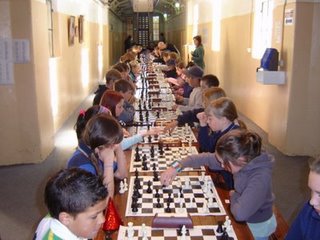
Yes, yesterday 245 primary schools students marched, strolled and bussed their way into the Old Castlemaine Gaol to compete in the Mount Alexander Schools Chess Competition.
Once inside students sat at tables lined along the spokes of the prison which made it a unique experience for the them. Chess Kids ran the competition, supplying all of the equipment, boards, pieces, clocks and computer program.
Each student played 7 games competing with others at their level. The winning team of 4 students get to play the state final next week.
The enthusiasm of the kids for chess has surprised all of our teachers and principals. The Mount Alexander Cluster chess/numeracy initiative mainstreamed chess as part of each school's numeracy work; tutors worked with the kids and their teachers passing on their passion for chess. One of the principals, Kevin Brown, said to me that he had attempted to get chess going with a little success but the tutors brought another level of knowledge and enthusaism to the classes.
In all of the schools I have worked in as a consultant one thing that kids constantly say a good teacher has is 'they really like their subject' or 'really like teaching'. Passion, you can't beat it.
Content knowledge in your discipline is important. It's obvious to kids that you really know what you are teaching and that you can assist them in moving to a higher level because of your knowledge. Both process and content are important. I'm emphasizing this because I seem to be reading a lot of teaching material which virtually dismissed content knowledge as unimportant. But in chess like other areas knowledge of your subject can inspire kids.
The chess competition was the finale of our initiative for this year. We aimed to finish on a high note.
Now we need to evaluate our pre and post test data, anecdotal information and conduct some student assessments to see if there has been some effect on the numeracy skills of our students. Some initial information looks positive.
If you have any stories about using games successfully in class let me know.
Visit Sam's blog:http://learningandknowing.blogspot.com/